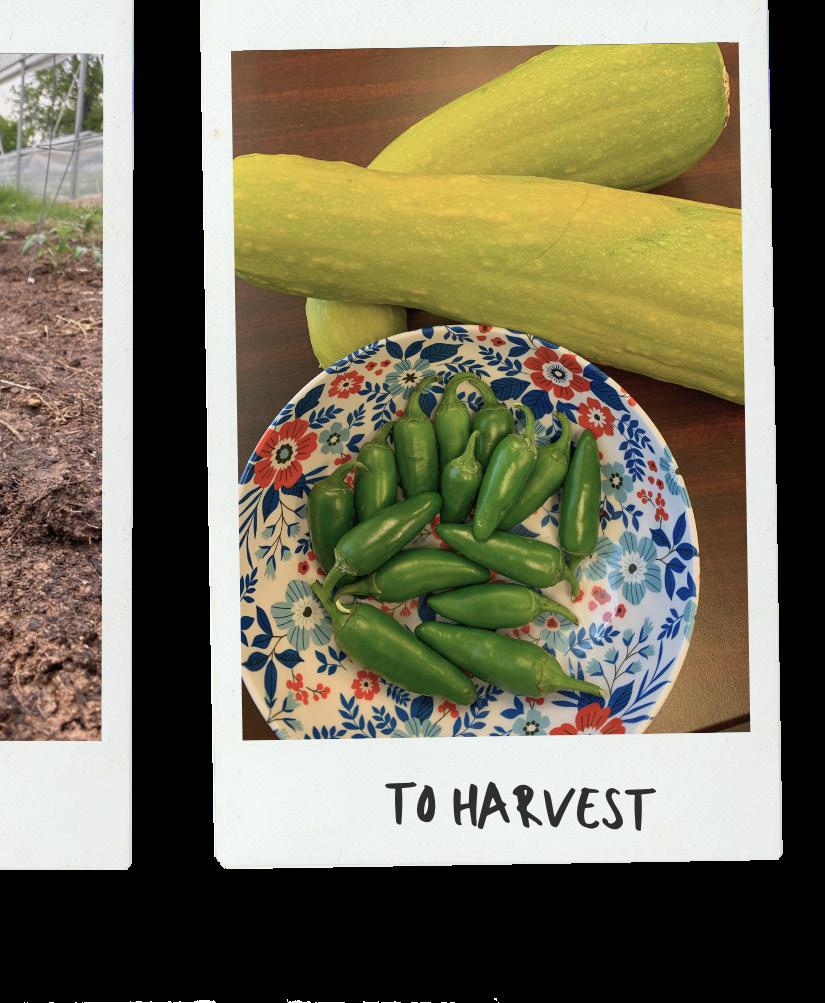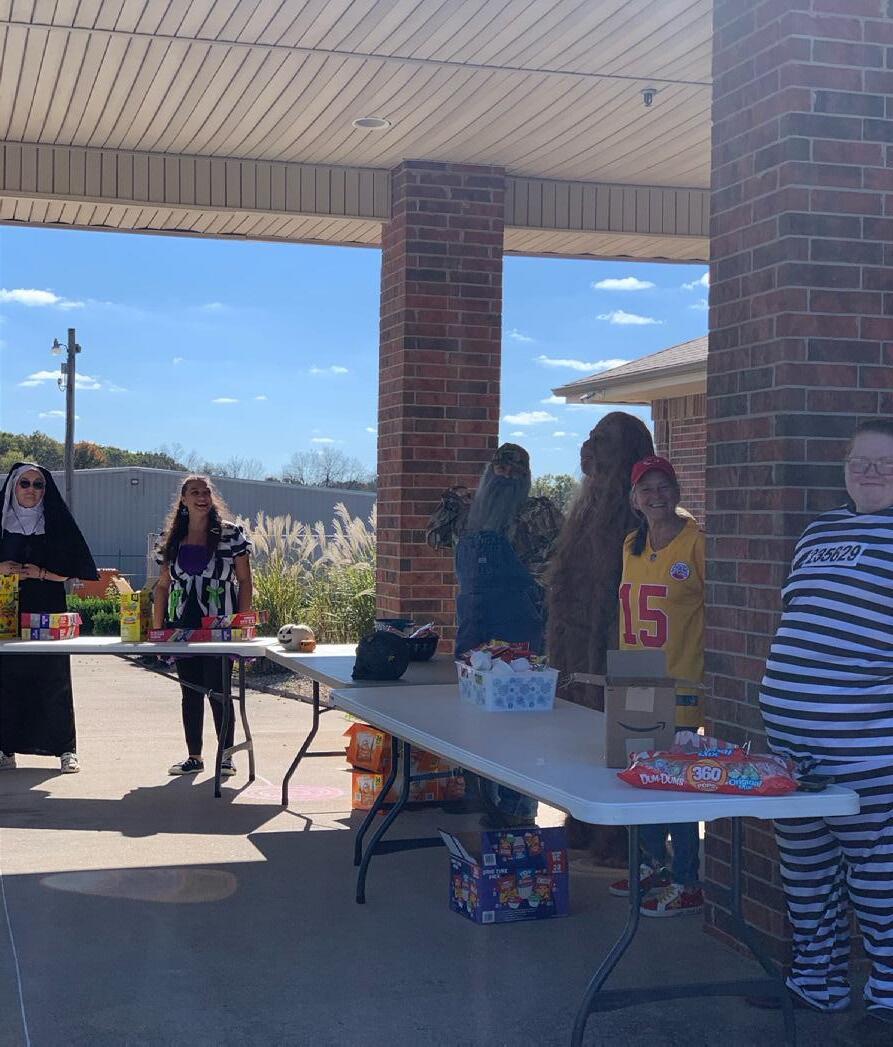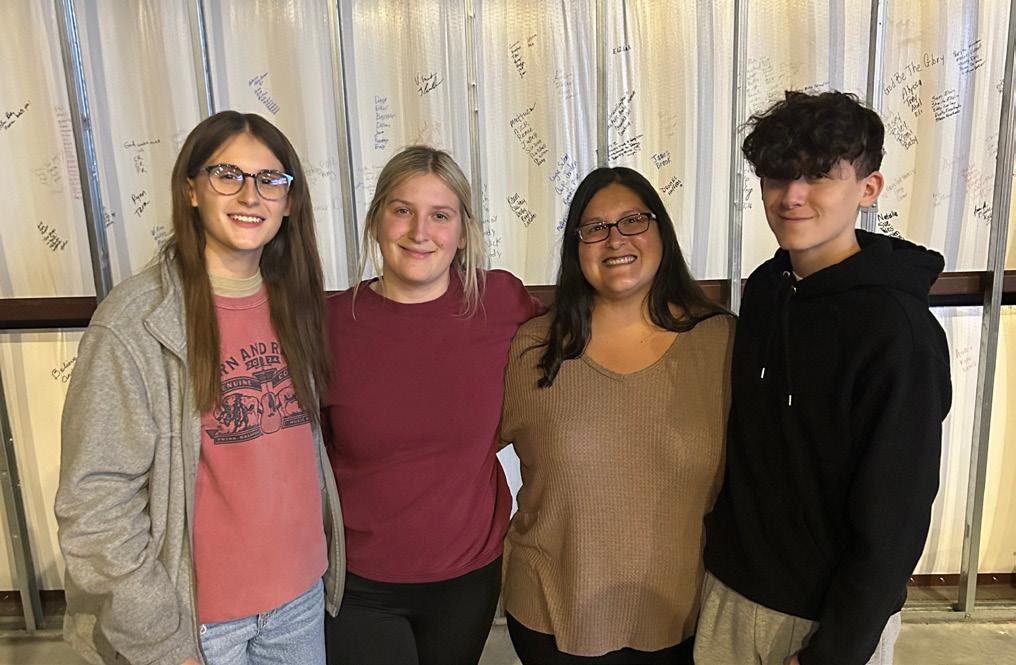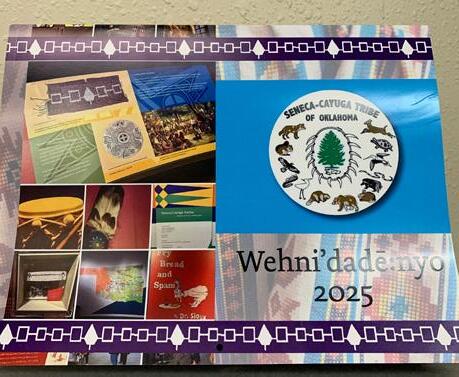





n Official Publication of the Seneca-Cayuga Nation IT IS






Greetings, Tribal Members,
I hope this edition of the newsletter finds you in good health and high spirits. This winter has certainly been full of surprises! Here in Oklahoma, we experienced a classic snowfall instead of the usual sleet, while even places like New Orleans and Florida saw their share of snow. It brought back childhood memories of snowfall with the air so clean and pure.
It is truly an honor to serve as your Chief, and I remain committed to working alongside the Business Committee to support the Nation’s growth and prosperity. We have several exciting projects moving forward, and the future continues to look promising.
One key development is the progress of our Nation’s mercantile store and RV park. The Business Committee has decided to approach this project in multiple phases, beginning with the mercantile store. The design has been refined, contracts have been signed, and funding has been secured. This initiative is particularly significant as it will contribute to our tax base while allowing us to supply necessities like food and fuel, as well as sell our own products, including our beef and buffalo.
Construction of the new Early Childhood Development Center (ECDC) is also moving along quickly, with completion expected in March or April and an official opening later in 2025. This will be a valuable addition to the services our Tribe offers within the reservation area.
Another project in the works is the revitalization of the tribal building in Miami, which previously housed our tribal office and the Indian Health Service (IHS) clinic. After years of disrepair, efforts are now underway to restore its usability. Several potential uses are being considered, including relocating the tribal museum to the building. This move would provide additional space for growth and offer expanded educational opportunities. Another possibility is partnering with behavioral health organizations to bring valuable services to our people.
While we continue making progress, we must also acknowledge the challenges that come with it. In business, obstacles often arise that can slow or complicate our efforts. As we navigate these challenges, it is crucial to keep our hearts and minds focused on who we are as a people. A strong and united community will allow us to thrive.
Recent events have demonstrated just how quickly circumstances can change and impact our Nation as a whole. The potential government shutdown of our access to grant funding remains a significant concern, as it could severely affect the services we provide and the livelihoods of our employees. The Nation relies heavily on grants to support nearly every program we offer. The Business Committee is closely monitoring the situation and will continue to adapt as needed in response to political developments affecting all Indian Country.
I leave you with these thoughts: Preparing for uncertainty requires all of us to work together to build a strong foundation for progress and stability. Along with that comes change. We will need to adapt and look forward to be successful. I look forward to your continued support in what the future holds. It is a privilege and an honor to represent our Nation and collaborate with the Business Committee to ensure our continued success. I wish you all the best in the days ahead—stay safe and well.
Nya-Weh (thank you)
Charles Diebold, Chief of the Seneca Cayuga Nation
GOOD NEWS
MEMBER PROFILE
ACCESSING BENEFITS
UPDATES
MEMBER PROFILE
PROTECTING OUR SOVEREIGNTY
UPCOMING EVENTS
FOOTPRINTS ON THE MILKYWAY

Charles Diebold, Chief
Curt Lawrence, 2nd Chief
Cynthia Donohue Bauer, 1st Council Person
Amy Nuckolls, 2nd Council Person
Jason WhiteEagle, 3rd Council Person
Tonya Blackfox, 4th Council Person
The Business Committee (BC) has re-established several committees, which include a BC member as the chairperson. They are actively collaborating on existing committees, both internal and external, to represent the Nation.
Amy Nuckolls is the chairperson for the Housing Committee.
Cynthia Donohue Bauer is the chairperson for the Education/Welfare Committee.
Tonya Blackfox represents the Nation for the Northeastern Tribal Health System Governing Board and the Claremore Indian Hospital Board of Directors.
Curt Lawrence works with the Tax Commission.



The Violence Prevention and Victim Services team is part of RISE—a coalition that includes local tribes affiliated with the Seneca-Cayuga Nation, such as the Peoria, Quapaw, Eastern Shawnee, Shawnee, Wyandotte Nation, Miami Nation, and Modoc Nation. RISE stands for Respect, Inspire, Support, and Empower, and the group meets monthly to plan upcoming recognition events and strategize community outreach.
In October, for Domestic Violence Awareness Month, they hosted the free Hope & Healing Resource Fair. The event was a wonderful day of community connection and resource-sharing, featuring live music by the Batey Creek band, informative booths, and complimentary goodies.





The staff had a spooktacular time delighting the students of Turkey Ford with ghoulish goodies during their annual walk of treats!





The Candyland Christmas Party was a sweet success! A big thank you to everyone who joined the fun, including special guests Santa and the Grinch! We loved celebrating the holiday season together and creating joyful memories with the kids.



Thank you to those who joined us for the 13th annual Stomp and Social Dance, on November 9th. We had a wonderful time coming together to honor our veterans, reflecting on their service and sacrifice with gratitude and heartfelt appreciation.




We had the joy of celebrating the holiday season with our elders, sharing a warm meal, meaningful moments, and spreading cheer through a festive food giveaway.
U.S. Navy Hospital Corpsman
Logan Weatherly Chilcutt received her promotion to Petty Officer Third Class as her daughter, Jane watches while her husband Alex Chilcutt, Senior Airman US Air Force pins her new rank on her uniform.


Phoenix Rhatigan won Gold in January in the 400m dash at the Rock Chalk High School Indoor Track Invitational at the University of Kansas! Phoenix is a Sophomore at Neosho High School and is currently the #1 ranked Sophomore in the State of Missouri in the 400m dash.
Congrats on your retirement, Pearlene Curtis! 40 years at Indigo Sky Casino!



Two native brothers fulfilled their lifelong dreams!
Carson and Kyle Collie have always dreamt of owning their very own trucking business. It started with watching their dad driving semitrucks as little boys (what’s cooler than that). They even got to ride along, watching their dad drive was something they were proud of. They looked up to their dad, in their eyes, he was a bad ace! They never fully pursued the dream until after their father passed away. They really moved forward with wanting to honor their dad after his passing. They are very proud to be native and have taught their children to be proud of who they are and where they came from!
Steven Boyd is a proud Seneca-Cayuga tribal member from the Wolf Clan. Steven is married to his wife, Tori and has two daughters, Grace and Sophia. Steven has been a pivotal influence on serving the Native American community in Ottawa County. He works for Indian Health Services and his job entails providing essential services such as water lines and septic systems to individuals at their primary residence and water districts in his jurisdiction. A big nyaweh to Steven Boyd for serving the indigenous community and making his tribe and family proud!

Samantha WhiteEagle is the Education Clerk for the Seneca–Cayuga Nation. In this role, Samantha is responsible for making sure students have access to the various funding sources available through the education program. This job requires paying attention to a lot of details while working directly with students to make sure they fill out applications, turn in paperwork, and meet the funding requirements.
Samantha grew up in Grove. She has worked for Grand Lake Casino, as well as several other companies in Tulsa and Northwest Arkansas. She eventually attended Oklahoma Wesleyan University, graduating Magna Cum Laude in 2018 with a degree in Business Management. Her degree was funded by Seneca–Cayuga Nation scholarships. Samantha had wanted to work for the Tribe for several years. She is thankful for the ways that she has benefited from being part of the community and wanted to give back. She applied for several positions over the years and started as the Education Clerk in August of 2024. Samantha says that “this is a great full-circle story. As a student I was funded by
the Tribe, which helped me get degree, which in turn aided in getting this job, and now I get to help others have more opportunity for education.”
There are many parts of the work that are rewarding for Samantha. She likes seeing students do well, gaining confidence, and learning new skills. One aspect of the job that is unexpected is that she gets to help parents learn to give their kids more responsibility. All parents want the best for their kids, but sometimes they try to do things that their kids need to do for themselves. Samantha gets to help parents learn to let go and equip their kids for adulthood.
Samantha is the mother of three children, Lillian, MaKayla, and Zachary. As a family, they are all very involved in their church, Mountain Movers Church. Her oldest daughter, Lillian Mercer is an Outreach Advocate in the Seneca–Cayuga Nation Violence Prevention and Victim Services Program. Her middle child, MaKayla is a student at Northeastern A&M College receiving funding by Seneca-Cayuga Nation scholarships. Her youngest child, Zachary is in the 8th grade and has benefited from the Youth School Clothing Fund and the Johnson O’Mally Program by Seneca-Cayuga Nation.
Samantha is dedicated to her work and hopes that she can help others “reach for the stars and never give up.”


DO YOU KNOW HOW TO ACCESS YOUR BENEFITS? HERE IS THE LIST!
There are many benefits available to you as a member of the Seneca-Cayuga Nation. Most benefits are available to anyone, no matter where you live. A few benefits are funded by federal grants and have some limits based on geography. For a full list of benefits, visit www.sctribe.com/service/forms. Here are some highlights:
Up to $1000 per year is available to help with rent, house repairs, medical bills, or financial hardship for members between the ages of 18-54. Call the Benefits Dept. at 918791-6025 or email benefits@sctribe.com for more information.
Up to $1,000 per ear is available to help pay for hearing aids. Call the Benefits Dept. at 918-791-6025 or email benefits@sctribe.com for more information.
Up to $750 is available per fiscal year to help pay for eyeglasses or eye exams. Call the Benefits Dept. at 918791-6025 or email benefits@sctribe.com for more information.
Money is available to help pay for dental treatment, braces, and dentures. Call the Benefits Dept. at 918-7916025 or email benefits@sctribe.com for more information.
Up to $2,500 per year is available to those 55 years or older, who have been a member of the Seneca-Cayuga Nation for no less than 20 years. Call 918-791-6015 or email benefits@sctribe.com for more information.
Money is available to help pay for funeral and burial expenses. An application must be made within six months of death. Call 918-791-6015 or email benefits@sctribe.com for more information.
Funds are available to help families have access to highquality child care. The child care program is funded by a federal grant and is limited to those living within 100 miles of Grove, OK. Contact Nikki Logan at 918-791-6055.
Youth Fellowship for School Clothing
$500 is available per student grades Pre K-12 to buy school clothing. Applications are open from July 1st to November 1st. Call Samantha WhiteEagle at 918-791-6041 for more information.
Up to $500 is available to high school seniors to help pay for student’s cap, gown, graduation announcements, senior pictures, class ring, ACT/SAT fees, and any other seniorrelated costs associated with college entry. Call Samantha WhiteEagle at 918-791-6041 for more information.
Scholarships are available to pay for higher education expenses. These funds can be used to attend an accredited college, university, trade, or vocational training school. Call Samantha WhiteEagle at 918-791-6041 for more information.
NTHS is a healthcare system for all native people. Located at 7600 S. HWY 69-A Miami, OK 74354. Call (918) 5421655 for more information.
The wellness center is a 24-hour fitness facility located at the Nation’s tribal offices. It is equipped with fitness equipment, showers, and lockers. Call Brittany Green at 918-791-6051 for more information.
The Seneca-Cayuga Nation, Grand Lake Casino, and Tobacco Company have various job openings throughout the year. For casino jobs, visit www.grandlakecasino.com/careers. For all other positions, call SCN Human Resources at 918-791-6042 or 6037 to learn more.
The Food Distribution Program is a federally funded effort to provide food to qualifying households within a specific geographic area around Miami, OK. Call 918-542-3443 for more information.
Various substance abuse and mental health treatments are available to tribal members. Call Kormah Dorko at 918-791-6046 for more information.
The Seneca-Cayuga Tag Office offers tags to Oklahoma Seneca-Cayuga Members. Call Nicole Reece at 918-791-6028 for more information.
Seneca-Cayuga Tribal Members ages 52, along with their spouse, can eat for free at the AOA. Members of other tribes over 60 can eat for free. Anyone can buy a meal for $5. Mealtimes are 11:00 am – 12:30 pm Monday-Thursday, and 9:00 am – 10:30 am on Friday. Call Rob Gibson at 918-791-6052 for more information.
Contact Brittany Green at 918-533-5515 for more information.
This program provides assistance for victims of domestic violence, dating violence, stalking, sexual assault, and victims of crime. Call Wendy Nichols at 918-791-6057 or Janet Backwater at 918-791-6059 for more information.
This program proposes to provide an avenue of hope for Seneca-Cayuga tribal children and their families by providing direct services and coordinating resources with other agencies in an attempt to prevent the breakup of Native American families. Call Kimberly Phillips at 918-791-6054 for more information.
The SORNA Coordinator maintains contact with law enforcement and monitors our CFR Court and local county jail logs for sex offenders that would fall under our jurisdiction. Call 918-791-6049 for more information.
The General Assistance Program (GAP) is funded by the Environmental Protection Agency to support the capacity building of the Department while maintaining a Tribal presence in Environmental issues impacting Tribal lands and members. This program is also funded by the EPA under the Clean Water Act Section 106. This funding allows for monthly sampling and monitoring of rivers, streams, and numerous in-lake sites, all within tribal jurisdictional boundaries. Call at 918-791-6035 for more information.
The Seneca Cayuga Nation has, through its Tribal Historic Preservation Officer (THPO), assumed duties of the State Historic Preservation Officer on trust lands as allowed under the National Historic Preservation Act I16 USC 470] Section 101 (d)(2). This office is partially funded by the National Park Service. Call William Tarrant at 918-791-6061 for more information.
The purpose of this program is to provide enrollment to eligible persons of the Seneca-Cayuga Nation. Call Anita Bearpaw at 918-791-6027 for more information.
Call Chris Arnold, EMT, CHPP, at 918-791-6075 for more information.
Funds are available for household repairs and rental assistance. This is a federally funded program that has geographic restrictions. Contact Michelle Morris at 918-791-6060 for more information.


The construction of the Early Childhood Development Center (ECDC) is progressing, though subject to change, with an expected completion between Spring and Summer 2025. Once the building is fully completed and the final inspection is approved, we will submit our application for state licensing.
After the application is accepted, a state licensing specialist will visit the center to inspect the facility and measure each classroom to determine the licensed capacity for children. The center must meet strict CCDF funding guidelines and uphold high-quality childcare standards.
ECDC will accept state and tribal subsidies as well as self-pay. Currently, the center is designed to support children from 6 weeks to 12 years of age. Total classification count will be determined at a later time.
To add your child to the waiting list, please contact our Center Manager, Denisha Gonzalez, at dgonzalez@sctribe.com or call (918) 791-6018



We believe everyone should have access to education. Education teaches values, builds confidence, creates opportunities, and fosters critical thinking, in addition to increasing career opportunities. The Seneca-Cayuga Nation encourages tribal members to take advantage of the available programs and further their education through the education department. The program proudly served approximately 86 students for Summer 2024, 263 tribal scholars for Fall 2024 semester, 100 for spring, 169 students with Johnson O’Malley school supplies and backpacks, 1,284 Pre-K through 12th-grade students for youth school clothing, and 23 seniors.

The education department is managed by Carol Brown and Samantha WhiteEagle. Together, they use a variety of funding sources to help provide scholarships and school supplies to students. These scholarships allow students to focus on their education by relieving some of the stress often associated with juggling school, work, and family. It is still up to the individual to succeed in school and apply their learning to their personal development and longterm career goals, but we can help provide the resources needed for people to take advantage of education.
The process for applying for various benefits takes 2–4 weeks. In each case, we work to ensure all requirements are met by reviewing everything for accuracy before sending checks in the mail. Our goal is to be fair and accurate, and if there is a problem, we will work with you to resolve it. We are always working to improve our processes and procedures.
While specific plans have not been made yet, we hope to offer skill-building workshops such as resume writing, scholarship education, tutoring, and interview skills in the
future. These services will set students up for success as they graduate and seek jobs in the marketplace.
To apply for any of the education programs, visit sctribe. com/services/education for more information and to find the application procedures. Several benefits are available. If you have any questions, please contact the Education Department by calling 918-791-6041 or emailing education@sctribe.com
Here are the programs currently available:
• Johnson O’Malley School Supplies and backpacks (must live within a 50-mile radius of the Grove complex).
• Youth School Clothing Funds ($500 annually for Pre-K through 12th grade).
• High School Senior Funds ($500 max to aid high school seniors with senior-related expenses).
• Higher Education Funding - Tribal scholarship funds and Higher Education funds (see below for details).
Here are the scholarships, grants, and financial aid programs currently available:
• Tribal Scholarships for full-time and part-time students up to $2,500 per semester (amount varies based on the number of credit hours enrolled in).
• Higher Education funding for Adult Vocational Programs up to $1,000 (amount based on program requirements).
• Education Supply Fellowship - one-time fellowship of $1,000 for full-time students (12 credit hours or more).
• Higher Education for Concurrent students aid in paying for books and school-related fees (amount varies based on the number of credit hours enrolled in and cannot exceed $2,500 per semester).
Pursuant to a General Council resolution, an Ad Hoc Ethics Committee was appointed in November 2024 to draft a proposed resolution to present to the General Council in June 2025. The purpose of the resolution will be to ensure any person working for the tribe is subject to a background investigation.
So far, the Committee met three times. The first meeting included Christy Lewis and Danielle Brashear. They gave insight into hiring practices and information on how casino employees are investigated under the gaming code.
At the second meeting, we heard from Kathryn Schaeffer and Nina Short to learn the intention behind the motions made at General Council to ensure we stay true to the intent. We also
met with Curt Lawrence for the same purpose.
In the third meeting, we met with members of the election committee to get information as to whether candidates for tribal office are screened or subjected to any sort of background investigation.
We are discussing the potential scope of the language, which employees will be subject to a background check and what types of offenses could make a prospective candidate ineligible for employment. We discussed that an appeal process will be necessary.
We will attempt to post minutes from meetings on the tribal website.
Flint Fire Ranch is our growing cattle operation. Over time Flint Fire Ranch will provide beef to Seneca–Cayuga Nation programs, as well as retail sales. We are building an operation that we can all be proud of, that provides for our needs, cares for the land, and protects our sovereignty. I n many ways we are ahead of schedule in the success we hope for.
We currently have 170 head of cattle. This herd size allows us to make a real impact. We will continue to supply homeraised ranch beef for the Green Corn annually. In a testament to our community commitment, we partnered with Brittany Green’s grant programs to distribute hamburger meat to the Elder distribution program on three occasions. The Grand Lake Casino Cares program also purchased a steer for distribution. We continue to care for the community together. We appreciate all these partnerships in this good cause!
This endeavor is not without challenges. The summer drought did make harvesting hay for the winder a struggle. Fortunately, we were able to put up 1,408 bales this season along with the 150 bales left over from the previous season we have the 1500 bales needed for the winter. This is a good reminder that cattle operations are impacted by many factors, some of which are out of our control.
Spring marks a renewed commitment to pasture improvement, focusing on eradicating invasive species and enhancing the land through plowing, disking, and seeding key areas. We aim to fence additional properties, establish ponds, and consider acquiring a manure spreader to utilize local chicken litter for fertilization.
While the buffalo heard does not represent as many head as our cattle operation, we continue to implement similar plan for the buffalo buy improving genetics, caring for the heard, and developing pastureland. We have also pursued substantial funding, submitting $1.5 million in grants from ITBC, BIA, and other sources, embracing the philosophy to aim high and seize opportunities.
Flint Fire Ranch is doing well, and the future is bright.

If you turn off Highway 10 near the tobacco company and navigate a few turns down the dirt road, you will discover a unique community of eight small cottages. As you stroll around the neighborhood, you will see people gathered on front porches, chatting and enjoying the outdoors. You might also spot others having a cookout or sitting around the fire pit. If you linger long enough, you’ll witness the neighbors caring for each other—helping with tasks around the house, picking up food, or simply checking in.
This community of caring neighbors resides in housing owned by the Tribe, specifically designated to assist Elders, veterans, and those with disabilities in finding stable, highquality housing. Currently, each home is occupied by Elders, many of whom previously faced housing challenges, including homelessness. These homes provide a stable, long-term option to help residents regain their footing after experiencing major life disruptions.
Lori McAnally moved into her house in April. She says that “everyone watches out for each other and checks in on each other.” The community of people and the house have allowed her to have independence and a place of her own. Lori has long advocated for the Nation to invest in housing, and she is thankful that she and so many others have benefited from that investment.
Michelle Morris, the Housing Administrator, says, “It makes me feel really good that I can help them be happy and feel like it’s home to them.” To her, this neighborhood represents
a hopeful vision of neighbors taking care of neighbors within the community.
Dina Sandahl, who lives in the cottages, put it this way,

“I feel exceptionally fortunate to be here in my new home. If not for my Seneca-Cayuga Nation’s assistance, I would be facing being homeless. The homes are very pretty and comfortable! I love being here out in the country where this new 8-homes Subdivision was built. Thank you goes to Michele Morris, and Amy for all their assistance in helping me obtain safe and affordable housing for me and Phoebe, my 3-year old Goldendoodle puppy! I moved into my new home on July 5, 2024 coming from the Portland, Oregon metro area. And there is no other place I want to be now! Absolutely the most perfect and wonderful miracle in my life!”
Housing is a challenge for many, but Michelle, Jeanna, and the Housing Program are dedicated to helping people secure a safe, healthy, and stable place to live. If you are struggling to find or maintain stable housing, visit sctribe. com/housing or call 918-791-6060 or 918-791-6038.
There are several forms of assistance available, and Michelle and Jeanna can help you determine which program will be best for you.

Grand Lake Casino remains a vital economic driver for the Tribe. Recent enhancements to the cage and players’ club have been wellreceived, creating a positive first impression for guests while also providing a more efficient and functional workspace for team members.
Currently, the casino leadership team is prioritizing the optimization of several internal processes, including transitioning accounting and revenue audit functions in-house. While these improvements may not be as immediately visible as physical upgrades, they are essential for fostering an efficient business operation. Grand Lake Casino remains committed to growing a thriving community, as highlighted with the recent purchase of beef from Flint Fire Ranch for distribution to Elders.

Written by his wife, Ana Murray
Jimmy Murray is the administrative assistant for the Substance Abuse program. He started the job in August, 2023, but is currently deployed to Syria with the 1140th Engineer Battalion, a Missouri Army National Guard unit. He will return from his deployment in June and resume his work at the Seneca–Cayuga Nation. We want to introduce him to you, so we asked his wife, Ana Murray, to write a profile, found below.
Jimmy Murray was, born in 1992 in Miami Oklahoma. He was adopted and raised by Dwight and Brenda Murray, and reintroduced with his grandparents, Jerry and Patty Shinn. They were a large influence in his life, instituting his lifelong connection to the tribe. Many people may know him as William Tarrants nephew.
Jimmy has long been surrounded by the Tribe, spending much of his early childhood at the grounds near his job. He joined the military in 2010, inspired by a close friend of his who was interested in joining but didn’t want to commit alone. So, he took it upon himself to motivate him and see where the path would lead.
His friend ended up leaving the military, but Jimmy decided to stay in and pursue a career after realizing the pace and challenges were rewarding. Currently, he is deployed with
1140th Engineer Battalion who are combat engineers. His roles have varied in his field. He’s taken on many responsibilities and has stayed very flexible to the everchanging environment. As his deployment approaches an end, they have given him the responsibility of project management. He now oversees and manage 6 locations in Syria.
Jimmy’s military experience has impacted his approach on the civilian side; from problem solving, to work ethic. He has worked with many nationalities and backgrounds and has always been immersed in a very diverse environment which gives him a humble approach to people’s struggles. He has a sixth sense for what people are feeling, and this has allowed him to provide support for many who were hesitant to reach out for help. I believe this ties directly into his military mindset. He is not afraid to be direct. He’ll ask the important questions up front to help condense obstacles into manageable tasks.
I believe these characteristics help him make the world better. He doesn’t have “one size fits all” pieces of advice, rather he listens first to provide guidance because he knows not all people are struggling in the exact same way. He helps people feel at ease, encouraging them to open up and find relief and peace. He understands information gathering isn’t about who can speak the loudest but listening and managing expectations.

Solitude is a large piece of what helps him keep balance. He often plays piano or likes to take off in the woods. As far as a life philosophy, he’s mentioned that we are our choices. And he reinforced this statement by saying yesterday’s choices may determine tomorrow’s outcome. But there is a larger picture that people miss. We are different people each year. And growth comes at various stages. He’s not concerned with what someone may have done in the past, but what the plan is moving forward. Mistakes are one of our best methods of growth, and we must allow ourselves the opportunity to move forward well before anyone else will. I’ve watched him use this thought process with our son. If he makes a mistake, he doesn’t snap at him. But he approaches it calmly and

methodically. A discipline disguised as a lesson that our son is much more perceptive to. He shows him where the error is and presents better options. He’s patient.
Jimmy has always had an interest in psychology and how the mind works. But he’s always had an even higher ambition to help people, at times placing himself on the line to establish a safety net for others. When he took this job as the Administrative Assistant for the Substance Abuse Program, he knew that he wouldn’t be directly tied into counseling, but he was excited to be given the opportunity to learn how it had operated while helping people. In the future Jimmy would like to study counseling and be a therapist in the Seneca–Cayuga Nation one day.









We’re on the lookout for inspiring stories of personal, educational, or professional achievements to feature in our next newsletter! If you or someone you know has a standout accomplishment that you’d like to share, we’d love to hear about it! Please email us at submissions@sctribe.com or a chance to be featured.

Understanding the various options to tag your vehicle in Oklahoma can be complicated, especially various laws change. We asked Nicole Reece and Curt Lawrence to provide an update to help you understand some of the issues surrounding tags and PIKEPASS, and help you understand the various choices you have for tags and using the turnpike system.
Seneca-Cayuga Nation (SCN) citizens reading this are likely familiar with tribal tags, but may not be familiar with recent developments in Oklahoma related to tags and PIKEPASS. The SCN Tag Agent and Tax Commission are actively following developments and working with other members of the Oklahoma Indian Tax Association and the National Indian Tax Association to protect our tribal sovereignty and the unique benefits that being an SCN citizen provides. This sovereignty and accompanying benefits have been hard won and require active protection. They are also subject to what seems lately to be an unrelenting attack by the current Oklahoma government that has forgotten that the state’s name came from the Choctaw words okla, ‘people’ and humma, which translates as ‘red’.
Oklahoma, under the leadership of Governor Kevin Stitt, has initiated well-orchestrated actions that are hostile to the state’s tribal citizens. These actions are an attempt to diminish tribal sovereignty by attempting greater state control of tribal tag holder’s information and taxation. A 1993 case, Oklahoma Tax Commission v. Sac and Fox Nation 508 U. S. 114 (1993) opened the door for other Oklahoma tribes to sell car tags to its citizens and bar the State from imposing “[it’s] motor vehicle excise tax and registration fees on tribal members who live and garage their cars principally on tribal land and register those cars with the Tribe” (508 U. S. 114). This case allowed tribes to pass their own ordinances and assess those taxes and fees for the benefit of the tribes. Some tribes gained additional revenue by not strictly enforcing the “who live and garage their cars principally on tribal land” requirement. Approximately 50 years later, under Governor Stitt, a tribal tag owner was ticketed for having a tribal tag that violated that requirement. Rumors of possible confiscation added
to the panic, all before tribal nations were offered a uniform state/ tribal compact that would offer state-wide registration for tribal citizens but would allow Oklahoma to collect the taxes and fees at a huge cost to tribal nations.
The “Mason-Treat Act” is another recent change in the law that impacts tribal vehicle information, but Tribes were not consulted when the law was developed. The Mason-Treat Act changes that timeline and process for registration when purchasing a car. Under the new law, when a new car is purchased in Oklahoma, the dealer issues a temporary tag. Regardless if the buyer later acquires a tribal tag, the dealer (and presumably the State of Oklahoma) has a tribal tag holder’s vehicle and personal information.
The reason this may be a problem is related to the recent changes in how tolls are collected on the various Oklahoma Turnpikes. Oklahoma Turnpike Authority (OTA) wants, but currently does not have, most tribal citizens vehicle registration connected to their billing information. “Plates” that were photographed going through toll booths manned by attendants or only by “PIKEPASS” did not result in a toll being billed or paid because OTA had no billing address. The SCN tag agent, Nicole, was informed that consequently, charges were accruing to those plates’ owners. OTA assured SCN that tribal tag holders that registered for PIKEPASS would not be liable for delinquent Plate Pay tolls. Plate Pay tolls are also significantly higher than PIKEPASS. OTA has exerted pressure and made promises in an attempt to get the SCN Tag Agent to provide tribal tag holder information to OTA. The SCN Tax Committee has not received sufficient assurance from OTA that tribal citizens would be forgiven delinquent Plate Pay tolls to provide OTA that information. The question is: how long before
OTA gets that information from other sources (such as car dealers who now have more information about who a car is registered to under the Mason-Treat Act) and begins collecting delinquent tolls?
Governor Stitt’s ploys have created a “wait and see” attitude for NITA and OITA member tribes. It is a complex situation—what recommendations does the SCN Tag Office have for tribal members that want to display tribal car tags?
1. As a sovereign nation, SCN is protective of our citizens information—you should be too! Avoid buying a new vehicle from an Oklahoma Dealer that could share your information.
2. SCN encourages tribal tag holders to be responsible for paying their toll and recommends PIKEPASS membership.
The Importance of Owning a Tribal Plate and Understanding the PIKEPASS
As members of Seneca-Cayuga Nation, we hold a special connection to our heritage and identity. One simple yet meaningful way to honor this connection is by owning a Tribal Plate for your vehicle. Not only does a tribal plate represent pride in our culture, but it also supports the tribe in various ways.
Why Own a Tribal Plate?
Having a Tribal Plate on your vehicle is more than just a symbol of your membership—it’s a statement of pride in who you are and where you come from. The revenue generated from tribal plate registrations helps support tribal programs and initiatives, including services that benefit our Nation. Whether you’re traveling across the state or simply driving around town, your Tribal Plate plays a part in preserving and promoting our culture for future generations.
Our opinion is that you can better protect your information by avoiding online registration. OTA says that at this time, Plate Pay and PIKEPASS do not share information, so tribal tag holders can better avoid delinquent Plate Pay tolls.
3. If you are a tribal tag holder that does not “live and garage (your) car principally on tribal land,” you should weigh the benefit of your tribal tag against the possible risk of being fined or worse—at least as long as Governor Stitt is in office.
The issues surrounding tags and Pike Pass can be complicated, but we are here to help you make decisions that are best for your specific situation. If you have any questions or need guidance, please call the Tag Office at 918-791-6028 or stop by in person 8am - 12pm and 1pm - 5pm Monday – Friday.
Tribal Plate vs. PIKEPASS: What’s the Difference?
While the Tribal Plate is a way to show your tribal affiliation, the PIKEPASS is an electronic toll system that helps you save time and money when traveling on toll roads. If you’re traveling frequently, especially on toll roads, having a PIKEPASS can make your journeys much smoother and more affordable. However, it’s important to understand that the PIKEPASS and the Tribal Plate serve different purposes.
The Tribal Plate is used for vehicle registration and identification, while the PIKEPASS is a tool for automatically paying tolls as you travel.
Why Should Tribal Members Have Both?
If you already have a Tribal Plate, you should consider adding a PIKEPASS to your vehicle. The two can work together to help make your travel more efficient. For tribal members, this also helps ensure that you’re properly supporting tribal initiatives while benefiting from the convenience of toll road access.
In short, owning a Tribal Plate and adding a PIKEPASS can make a significant difference in how you travel, while supporting our tribe at the same time.
If you have any questions or need assistance with getting a Tribal Plate or PIKEPASS, please contact our office. We’re here to help you!


To show respect for our Tribal family that have passed on, we acknowledge them here today.
Geraldine Walker 8/2/2024
Nicole Fausett 8/23/2024
Gary Zosel 9/28/2023
Keith Crowe 9/2/2024
Tommy Waldon 11/5/2024
Lee Fortney 11/17/2024
Norma Ross 11/18/2024
Patty Harjo-Shinn 11/24/2024
Jacob Tyner 12/23/2024
Sandra DeFever 7/17/2024
Joshua Nielsen12/26/2024
Mary Sue Patterson 1/3/24
Sandra Kingston 1/22/25
Terry Whitetree 1/28/25
Kenny Dale Wolfenbarger 1/30/2025
Money is available to help pay for funeral and burial expenses. An application must be made within six months of death. Call the Benefits Department at 918-791-6025 or e-mail benefits@sctribe.com for information.

April 18th – Good Friday
May 26th – Memorial Day
June 19th – Juneteenth
July 4th – Independence Day
August 4th – Green Corn
IF
June 7th
General Council
August 3rd Kids Zone
August 4th First Day of Green Corn
Watch for details coming soon about Sundance, strawberry dance, and blackberry dance.





• Purple jacket w/ Tree of Peace on the back- $40.00
• Coffee Mugs- $5.00ea.
• Hat- $10.00
• Large Purple Cups w/logo- $25.00
• Woodland print fleece blanket- $25.00
• Candles- $17.00
• Native print fleece blanket- $20.00
• Native Print Backpack- $25.00
The gift shop also carries jewelry, bandanna’s, umbrella’s, Tribal flags, hat bands and much, much more!




To update your address please mail this form to”
Department P.O. Box 453220 Grove, Oklahoma 74345
Tribal children at this address:
Submitted By (print)
If the change of address is being submitted for a minor child or incompetent adult, please sign below: Parent/Guardian Signature

Keep up with the latest news, events, and updates: Official Facebook: www.facebook.com/OfficialSenecaCayugaNation Access benefits and government information: Sctribe.com